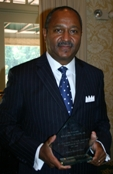Judge Wilford Taylor, Jr. '78 Honored by Law School

Dean Taylor Reveley presented the 2007-08 St. George Tucker Adjunct Professorship Award to Judge Wilford Taylor, Jr., J.D. '78, at a luncheon at the College's historic Wren Building on Sept. 6. The award, created in 1995, is given each year to a member of the adjunct faculty for outstanding service.
In his remarks to an audience comprising faculty, staff, students, and members of Judge Taylor's family, Dean Reveley noted that Judge Taylor "has been living the life of the citizen lawyer so prized at William & Mary." After graduating from Marshall-Wythe in 1978, he began his legal career in Hampton Roads, first in law practice with Bobby Scott, now a member of Congress, and later as Deputy City Attorney for Hampton. In 1985 he was appointed to serve on the Virginia General District Court for the Eighth Judicial District. He was elevated to the Virginia Circuit Court ten years later.
Judge Taylor has shared his legal expertise with students through his teaching of Trial Advocacy and Therapeutic Jurisprudence courses at the Law School and currently serves as director of the Law School's Trial Advocacy Program, a post he has held since 2005. In addition, Dean Reveley enumerated the numerous commissions and task forces on which Judge Taylor has served, including, for example, the statewide Commission for Jail and Prison Overcrowding, the Council on Human Rights, the Criminal Justice Services Board, the Task Force for Gender Bias in the Courts, the Judicial Performance Task Force, and the Commission on Virginia Courts in the 21st Century. He is currently working with the Chief Justice's Indigent Criminal Defense Training Initiative and the Court Benchbook Committee.
Judge Taylor grew up in Hampton, Va., and, in addition to a juris doctor, he holds a bachelor's degree from Hampton University and a master's degree from the University of Richmond. Before law school, Judge Taylor served in the Army for three years, graduating from the Army War College and attaining the rank of colonel.
The Dean shared excerpts of the accolades that the judge has earned from his students. "Great class," wrote one. "I am much more at ease with the thought of handling a trial now." Another said, "This professor is outstanding - tremendously gifted, always prepared, most effective as an instructor." Other comments were more succinct. "Judge Taylor is wonderful," said one. "Judge Taylor is terrific," noted another.
Dean Reveley shared the thoughts of Judge Walter Felton on Judge Taylor's prowess as a teacher. Judge Felton was instrumental in enlisting Judge Taylor to be a part of the Trial Advocacy Program. According to Judge Felton, "Judge Taylor was quickly recognized by students in Trial Advocacy as an enthusiastic and knowledgeable teacher. His experience on the bench was readily apparent in his instruction. He consistently found ways to improve the classroom instruction, drawing on the wisdom of a sitting trial judge, from voir dire and jury selection to closing argument. For students who were a little timid at first in examining witnesses in class, or handling the awkward experience of introducing an exhibit, he was supremely patient and supportive. For those who had had some limited trial work in the summer before the third year or otherwise, he insisted on a higher level of performance. His critiques of students were always constructive. His energy and enthusiasm were infectious."
St. George Tucker was the second professor of law at William & Mary and a pioneer in legal education. He drafted a formal description of the requirements for a law degree at the College, which included an exacting schedule of qualifying examinations in history, government and related pre-law subjects. Tucker's course material was published as the first American edition of Blackstone's Commentaries on the Laws of England. For a generation, Tucker's volume was considered the leading authority on American law.